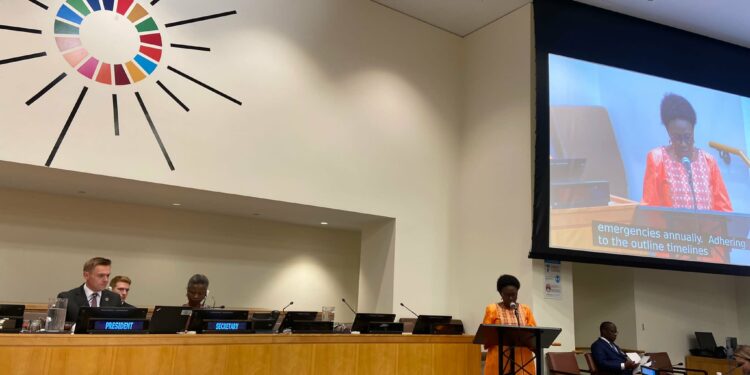The Minister of Health Dr. Jane Ruth Aceng has asked African leaders to start making bigger and smarter investments in their countries’ Health sectors as a vehicle to move their nations closer to Universal Health Coverage by 2030.
While giving her speech in the ongoing United Nations General Assembly High-Level Meeting on Universal Health Coverage, Minister Aceng alluded that low-developed countries need to have strategic shifts in policy and programming to ensure that communities, governments and their partners focus on programs with the highest impact to improve health outcomes and well-being of their people.
On Uganda’s progress toward attaining Universal Health Coverage by 2030, the minister revealed to the High-level meeting that the Government of Uganda and its partners are committed to achieving it and that’s why Uganda developed a Universal Health Coverage Roadmap 2020 to 2030, which lays out the major policy actions to faster progress in achieving UHC coverage.
She also added that through the UHC roadmap 2020-2030, Uganda has made significant progress over the last two decades to achieve Universal Health Coverage which has been evidenced by improvement in some health indicators
According to her, because of the UHC roadmap 2020-2030, there has been a reduction in infant mortality from 88 to 36/1,000 live births, Reduction in Under-five mortality rate from 151 to 52/1,000 live births, Reduction in maternal mortality ratio from 505 to 189/100,000 live births, Increase in deliveries attended to by skilled health providers from 37 per cent to 91 per cent, Reduction in the prevalence of HIV from 18 per cent to 5.4 per cent and Increase in life expectancy from 46 to 64.8 years.
She however noted that despite the physical progress, Uganda is still facing challenges to fully attain UHC coverage due to limited investment to foster improved accessible and quality health services for the population.
“Despite the above improvements, progress towards UHC coverage is still slow. Uganda therefore commits to the following; Strengthening community-led interventions through programs that build the capacity of the community health workforce. Implementing programs that address the social determinants of health at all levels e.g.; water and sanitation, food security, education, safe transport and housing etc.,” she said.
Other factors she mentioned included; Increasing investment in health infrastructure, medical products, technology; and digitising health information, Building the capacity of the health workforce in terms of numbers, skills, and capacity for research and development while addressing motivation and retention. And addressing financial risk protection through the introduction of the National Health Insurance Scheme to protect households from catastrophic health expenditure.
As far as Universal Health Coverage is concerned in Uganda, there is still limited access to healthcare and 41 per cent out-of-pocket expenditure. This means that sometimes, people have to sell their investments to pay for healthcare which has kept them in poverty. Which calls for Investments in health infrastructure (to provide facilities that have the necessary equipment). This should be undertaken to a greater extent, especially in regions with low health facility population coverage.
Pandemic Prevention, Preparedness and Response
The minister also informed the delegates that Uganda welcomes the Political Declaration on Pandemic Prevention, Preparedness and Response and reaffirms the call for timely, urgent and continued leadership, to implement coherent and robust actions, to strengthen pandemic prevention, preparedness and response, and fully address the direct and indirect consequences of future pandemics.
She however, called on. the Intergovernmental Negotiating Body (INB) to conclude discussions on the amendments of the International Health Regulations or other international instruments on pandemic prevention, preparedness and response, that prioritizes the importance of timely access to medical countermeasures, including vaccines, therapeutics, diagnostics and other health products.
“Regarding access and benefit sharing of medical products; the pandemic instrument should emphasize that all member states share products with the WHO including all pathogens with human pandemic potential and genomic sequence data. With respect to technology transfer, developing countries should be supported to promote local manufacturing of medical products in Africa. Provisions for this should be included in the pandemic instrument under discussion,” she said.
She also asserted that because of intellectual property rights which have set obstacles for developing countries to manufacture or access medical countermeasures as it was seen with the COVID-19 vaccines, there is a need to waive such stringent measures.
She also appealed to the international community to mobilize the necessary resources to support Africa’s endeavours in preventing, preparing for, and responding to outbreaks and epidemics, which account for more than 100 major public health emergencies annually.
Do you have a story in your community or an opinion to share with us: Email us at editorial@watchdoguganda.com










